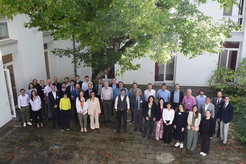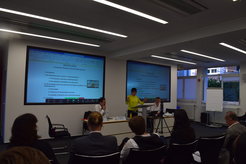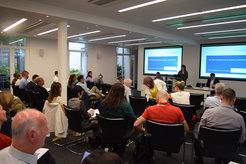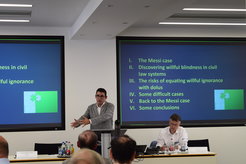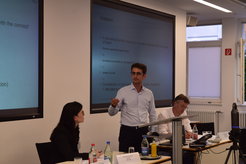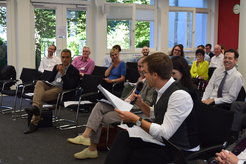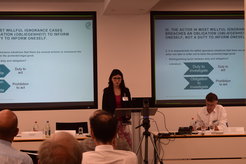
Blame for Ignorance? – Perspectives on Willful Blindness and Mistakes of Fact
Workshop • September 5–7, 2024 • Freiburg/Germany
Max Planck Institute for the Study of Crime, Security and Law
Can a person be blamed for turning a blind eye to the circumstances of his or her conduct? There is no clear answer to this question and yet it determines acquittal or conviction in cases involving crimes such as terrorism, rape, drug trafficking, and money laundering. Even a conviction for crimes against humanity may be secured by blaming someone for ignorance; the same rationale applies to responsibility within corporations or military groups. From 5–7 September 2024, we would like to discuss this question and the perspectives on willful blindness and culpable mistakes of fact in a workshop jointly organized by the Max Planck Institute for the Study of Crime, Security and Law, Freiburg and the University of Göttingen. Cutting through the fields of philosophy, criminal theory, and criminal procedure, the workshop will address the theoretical, doctrinal, and practical issues of (culpable) mistakes of fact. By bringing together scholars from different civil law and common law jurisdictions, the workshop will provide a platform for a lively international and interdisciplinary debate on these issues.
Program
| Thursday, 5 September 2024 | |
|---|---|
| 09:00–09:30 | Welcome and Introduction Philipp-Alexander Hirsch (Freiburg) and Alexander Heinze (Göttingen) |
Thematic Section I: Preconditions for the Treatment of Mistake of Fact in Criminal Law and Criminal Justice
The larger frame of willful ignorance is the treatment of mistakes in criminal law. It depends on a plethora of decisions governing fundamental issues such as the reasoning about criminal liability and its structure, matters of subjective imputation, the definition and concept of intent, etc.
| 09:30–10:30 | Tatjana Hörnle (Freiburg): “The Role of Mistakes in Criminal Law Doctrine” Matthew Dyson (Oxford): Response |
|---|---|
| 10:30–11:00 | coffee break |
Thematic Section II: Moral Principles and Problems of the Willful Ignorance-Doctrine
This subject area revolves around the issues of blameworthiness, culpability and responsibility. Can the agent be blamed for willfully ignoring certain facts or circumstances? What are the moral principles and problems of the willful ignorance doctrine? How do reasons and motives for ignorance come into play?
| 11:00–12:00 | Alexander Sarch (Surrey): “Mens Rea Imputation, Rule of Law and Willful Ignorance as Evasion” John Child (Birmingham): Response |
|---|---|
| 12:00–13:00 | Jochen Bung (Hamburg): “Willful ignorance as a problem of rationality” David Luban (Washington): Response |
| 13:00–14:30 | lunch break |
| 14:30–15:30 | Daniel Miller (Morgantown): “’Should Have Known’ Isn’t Good Enough: Why Culpable Ignorance Requires Awareness” Levin Güver (London): Response |
| 15:30–16:00 | coffee break |
Thematic Section III: Epistemic Principles about Knowledge and Ignorance
It is said that willful ignorance is equivalent to knowledge – or being treated as such. Is that epistemically accurate? What are the epistemic principles of knowledge, acceptance, and ignorance?
| 16:00–17:00 | Antony Duff (Stirling): “How could you be so blind?” Milan Kuhli (Hamburg): Response |
|---|---|
| 17:00–18:00 | Michael Serota (Los Angeles): “Community Views & Criminal Minds” AJP Fassnidge (Aberdeen): Response |
| 19:00 | dinner |
| Friday, 6 September 2024 | |
|---|---|
| 09:00–10:00 | Rik Peels (Amsterdam): “Varieties of Ignorance and Why They Matter” Claudia Wittl (Freiburg): Response |
| 10:00–10:30 | coffee break |
Thematic Section IV: Procedure, Evidence and Proof
The problem of willful ignorance also raises questions of criminal procedure, evidence and proof, which will be addressed in thematic section IV: What fact-finding and reason-giving is involved in determining the relevant mental state? How are juries being instructed (so-called “ostrich” instructions) and how do they treat different motives and reasons for ignorance? Can willful ignorance be established through broader admissibility of evidence or the free proof principle?
| 10:30–11:30 | Christoph Wolf (Wiesbaden): “Procedural determination of intent despite a perpetrator’s ignorance?” Paul Roberts (Nottingham): Response |
|---|---|
| 11:30–12:30 | Manuel Cancio Meliá (Madrid): “Function of Mens Rea and Evidence Standards” Frank Bleckmann (Freiburg): Response |
| 12:30–14:00 | lunch break |
| 14:00–15:00 | Thomas O’Malley (Galway): “Wilful and Culpable Ignorance: A Common Law Perspective” Julia Geneuss (Bremen): Response |
Thematic Section V: Willful Ignorance, Recklessness and Dolus Eventualis
Knowing, accepting, should have been aware of, and ignoring – what should the test for willful ignorance be? Is there a need and a place for legal transplants, especially in light of the similarities and dissimilarities between willful ignorance, recklessness, and dolus eventualis? Or is “willful ignorance” merely a terminology for a concept that is applied in other legal systems under a different name?
| 15:00–16:00 | Ramon Ragués Vallès (Barcelona): “Is there a place for willful blindness in civil law systems?” Luís Greco (Berlin): Response |
|---|---|
| 16:00–16:30 | coffee break |
| 16:30–17:30 | Svenja Schwartz (Freiburg): “Transplanting willful ignorance as dolus into continental doctrine” Ivó Coca-Vila (Barcelona): Response |
| 17:30–18:30 | Gabriel Pérez Barberá (Buenos Aires): “Mens rea in review. A comparative analysis of crass and willful ignorance” Sandra Marshall (Stirling): Response |
| 19:00 | dinner |
Saturday, 7 September 2024
Thematic Section VI: Willful Ignorance Applied
Thematic Section VI shifts the focus to the role of the concept of willful ignorance in various legal fields and forms of criminality, e.g. international criminal law, white-collar crime, sexual offenses, and corporate criminal liability and other organizational liability. What is the impact of willful ignorance in these contexts, and to what extent should or shouldn’t it be a factor in liability?
| 09:30–10:30 | Elies van Sliedregt (Tilburg): “Excuse Theory in International Criminal Law” Antonio Coco (Essex): Response |
|---|---|
| 10:30–11:00 | coffee break |
| 11:00–12:00 | Carl-Friedrich Stuckenberg (Bonn): “Ignorantia affectata, crassa et supina – The roots of willful ignorance in the Continental ius commune” Georgia Stefanopoulou (Hannover): Response |
| 12:00–13:00 | Beatriz Goena Vives (Barcelona): “The Crime of being in Charge. Willful Ignorance in Applied in Economic Criminal Law” Kilian Wegner (Frankfurt a.d.O.): Response |
| 13:00 | Closing Remarks Philipp-Alexander Hirsch (Freiburg) und Alexander Heinze (Göttingen) |
Next Steps
The results of the workshop are expected to be published in dedicated comprehensive publication towards the end of 2025.
About us

The workshop is organized by Dr. Alexander Heinze, Dr. Dr. Philipp-Alexander Hirsch and Svenja Schwartz.
Alexander Heinze is an Assistant Professor at the Institute of Criminal Law and Justice at the Georg-August-University of Göttingen. He specialises in criminal law and criminal procedure law as well as international criminal law.
Svenja Schwartz is a PhD student at the Max Planck Institute for the Study of Crime, Security and Law (Department of Criminal Law, Director Prof. Dr. Tatjana Hörnle) and a member of the Independent Research Group “Theory of Criminal Law”. Her dissertation deals with the topic of “willful ignorance”, which inspired this workshop.
Philipp-Alexander Hirsch is Leader of the Independent Research Group “Criminal Law Theory” at the Max Planck Institute for the Study of Crime, Security and Law in Freiburg. His research focuses on criminal law and criminal procedure, legal philosophy and legal theory, and the history and philosophy of criminal law in the Age of Enlightenment.
The Max Planck Research Group “Criminal Law Theory” focuses on the analysis of substantive criminal law and criminal procedure and the doctrine in these areas; the analysis centers on the underlying normative structures and principles in order to assess their coherence, justifiability, and persuasiveness. The aim is to draw on the fruits of this analysis to engage in normative theory-building that proposes solutions to problems in criminal law that go beyond interpreting the positive law.
Summary and Gallery
Can a person be blamed for turning a blind eye to the circumstances of his or her conduct? There is no clear, universal answer to this question across different jurisdictions. Yet, it determines acquittal or conviction in numerous criminal cases. The conference organized by “Criminal Law Theory” research group at the Max Planck Institute for the Study of Crime, Security, and Law, Freiburg and the University of Göttingen took place from 5 to 7 September 2024 and aimed to reconstruct different perspectives on the topic of “willful blindness” in terms of conceptual content. Cutting through the fields of philosophy, criminal theory, and criminal procedure, the workshop addressed the theoretical, doctrinal, and practical issues of (culpable) mistakes of fact. By bringing together interdisciplinary scholars from different civil law and common law jurisdictions, the workshop provided a platform for a lively international and interdisciplinary discussion. The program included presentations on the preconditions for the treatment of mistake of fact (1.), moral principles and problems of the willful ignorance-doctrine (2.), epistemic principles about knowledge and ignorance (3.), procedure, evidence and proof (4.), willful ignorance in the context of recklessness and conditional intent (5.) and questions of application (6.).
